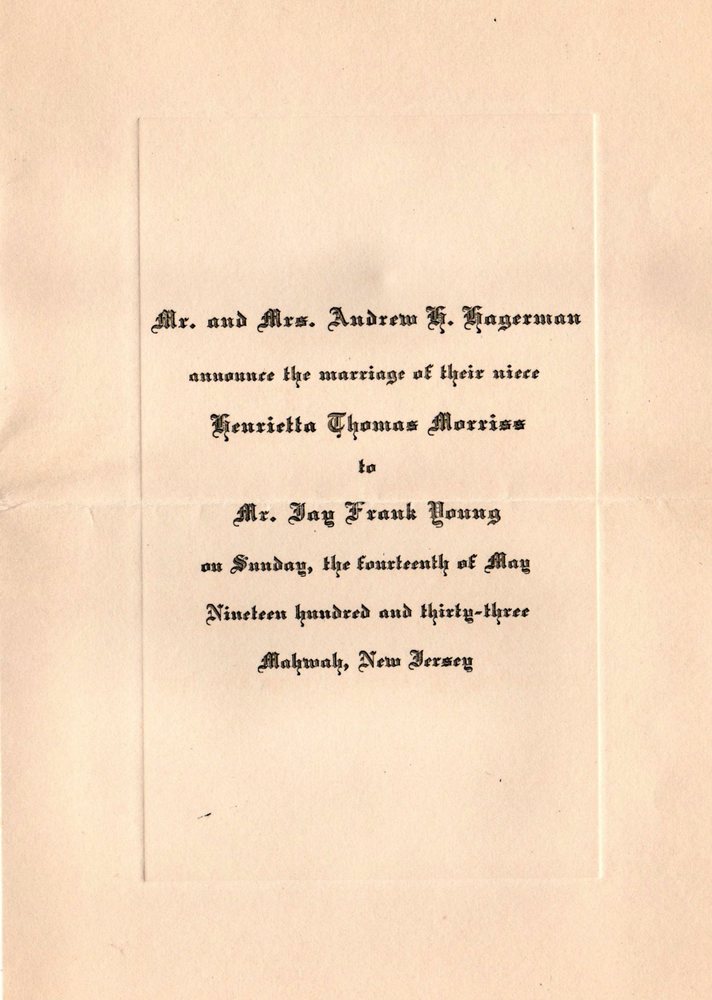Gender Roles and Dating
In American society and within dating and courtship trends, there were expected gender roles that men and women were expected to follow. These gender roles were agreed upon in the Victoria era and reigned for several decades. Society expected men to be independent, ambitious, assertive, and have a varied life in the public. Women on the other hand, were expected to be dependent, conservative, be full of love and are considered weak and pious (Mumm, 92-93).
These gender roles displayed themselves in dating and courtship and dictated how each person should behave. Men had to be assertive and be the ones who called at a woman’s home, or take a woman out to restaurants and be expected to pay. These gender roles were stringent in American society. They are demonstrated in the letters between Henrietta Morriss and J Frank Young. Young often wrote of longing to see Henrietta and even wrote that he would visit her mother while Henrietta was away at school.
In the letters, Frank makes his view on gender when he states,
That is enough shop talk. I realize that you are more interested in other things. Why I don’t want to come down to see you on Wednesday when it is only forty miles away. You would do it anyway but it is not nice for a girl to come see a fellow, or even call him up on the phone (Young, December 15, 1930).
When Frank wrote this to Henrietta, he demonstrated that ordinary people follow the norms of society and fit into a larger history. This writing solidifies his notion that men should be the ones to call and visit women, and not the other way around.
Marriage was the end goal for women and men, however, women faced more backlash if they did not marry. Rothman brings up that women were expected to have a bigger investment in marriage, and that through marriage, they would fulfil society’s role for them as wife and mother (Rothman, 245). Frank wrote to Henrietta about a teacher at his school in Suffern that wanted to be a mother without being married. His letter stated, “This particular teacher afterward told one of her male students that she would like to be a mother without being married . . . The boy told his parents . . . however valid the reason for which they sent her it is good she left. For God’s Sake Henrietta don’t be an old maid. No! Marry me instead” (Young, January 24, 1928). Frank also this woman as one who stepped beyond the rigid gender norms of society.
Women were raised to believe that marriage and children were the goals for their lives. Most women conformed to this narrative but some did not. When Frank asks Henrietta to marry him so that she does not become an old maid, he was describing a real fear of women who could not secure a man. Women who did not marry young were seen as old maids and spinsters, and sometimes as fallen women, if they did not marry something had to be wrong with them.
Henrietta and Frank married in 1933, and in 1940, Henrietta became a mother to their only daughter. Their story matched with the larger historical narrative of courtship leading to marriage. Henrietta and Frank may not have followed the narrative exactly though. They waited seven years before they had their only daughter Martha Jane Young. It could be speculated that Henrietta may have worked in those seven years before having her daughter. Henrietta and Frank may have had problems conceiving children or it may be speculated that they could have postponed having children due to the Great Depression. The fact that Henrietta may have worked after marriage also strays from the norm, but ultimately Henrietta fulfilled her roles as a woman when she got married, and had her child.
Though gender roles are less stringent today, they are still around. On dates, men are still expected to pay and women are still expected to marry and have children. Women who choose to work over having children, or who do not want children are looked down upon as selfish. Women are criticized for showing the same characteristics as men in relationships, such as paying for dates or being a bread winner for the family, which shows things have not progressed as far they might have.
